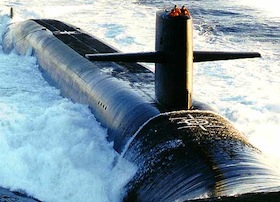The $100 Billion Submarine Program
June 24, 2011
Featured Image
Today's top nuclear policy stories, with excerpts in bullet form.
Stories we're following today: Friday, June 24, 2011.
An Analysis of the Navy’s Fiscal Year 2012 Shipbuilding Plan - Congressional Budget Office [link]
- CBO has revised its overall cost projection of the new replacement ballistic missile submarine program [SSBN(X)] for the United States Navy.
- CBO puts the total cost of procuring 12 SSBN(X) submarines at between $96 billion and $101 billion, down from last year's estimate of up to $110 billion.
- CBO’s 2011 estimate was an average of $8.3 billion per submarine. That cost has dropped to $7.2 billion, but this is still far above the Navy's target of $5 billion.
U.S. Adds Sanctions on Tehran - Keith Johnson in Wall Street Journal [link]
- The U.S. imposed sanctions … targeted specifically at the Revolutionary Guard … [which] plays a major role in proliferation activity, supports terrorism in the region, and commits human-rights abuses at home.
- [United States] Treasury officials say the Revolutionary Guard has become increasingly important to Iran's economy as international sanctions undercut Tehran's international trade abilities.
- “... until Iran is prepared to engage seriously with us on such a solution, we will continue to increase pressure against Iranian entities of concern," Secretary of State Hillary Clinton and Treasury Secretary Timothy Geithner said in a joint statement.
Fusion Experiment Faces New Hurdles - John Upton in The New York Times [link]
- Federal researchers [at Lawrence Livermore National Laboratory] are seeking to ... study — and hopefully harness — the type of energy produced by hydrogen bombs and the sun.
- [But] according to a worst-case scenario outlined in a draft environmental report, an average of one worker involved in the experiments could die every 18 years from cancer caused by radiation exposure.
- Tri-Valley CAREs, a watchdog group that monitors Lawrence Livermore, argues that the National Nuclear Security Agency … should not allow an increase in the amount of radiation produced by the fusion project. “There is no safe level of exposure,” said Marylia Kelley, the group’s executive director.
Nuclear terrorism can cause another Fukushima: expert - Reuters [link]
- Global action to protect the nuclear industry against possible terrorist attacks is urgently needed, a leading expert [Matthew Bunn of Harvard University] said.
- "Both al Qaeda and Chechen terrorist groups have repeatedly considered sabotaging nuclear reactors … The nuclear industry in many countries is much less prepared to cope with security incidents than with accidents," wrote Bunn.
- "The chance that the next big radioactive release will happen because someone wanted to make it happen may well be bigger than the chance that it will happen purely by accident … Disasters like Fukushima can be caused not only be [sic] accident but by terrorist action."
A Criteria-Based Approach to Nuclear Cooperation With Pakistan - Toby Dalton, Mark Hibbs and George Perkovich in Carnegie Endowment Policy Outlook [link]
- [T]he [Fukushima] accident in Japan provides Beijing with an opportunity to pause and contemplate conditioning [its decision to build two additional nuclear power reactors in Pakistan] on improvements in nuclear safety and security.
- Beijing could consider the possibility of developing within the Nuclear Suppliers Group (NSG) a criteria-based approach to nuclear cooperation … [which] would provide a roadmap for states without FSS, including Pakistan, to qualify for civil nuclear cooperation.
- This strategy thus has the potential to resolve this issue in a way that … provides China with incentives to reconsider its cooperation with Pakistan, and gives Pakistan the international legitimacy it desperately seeks.



